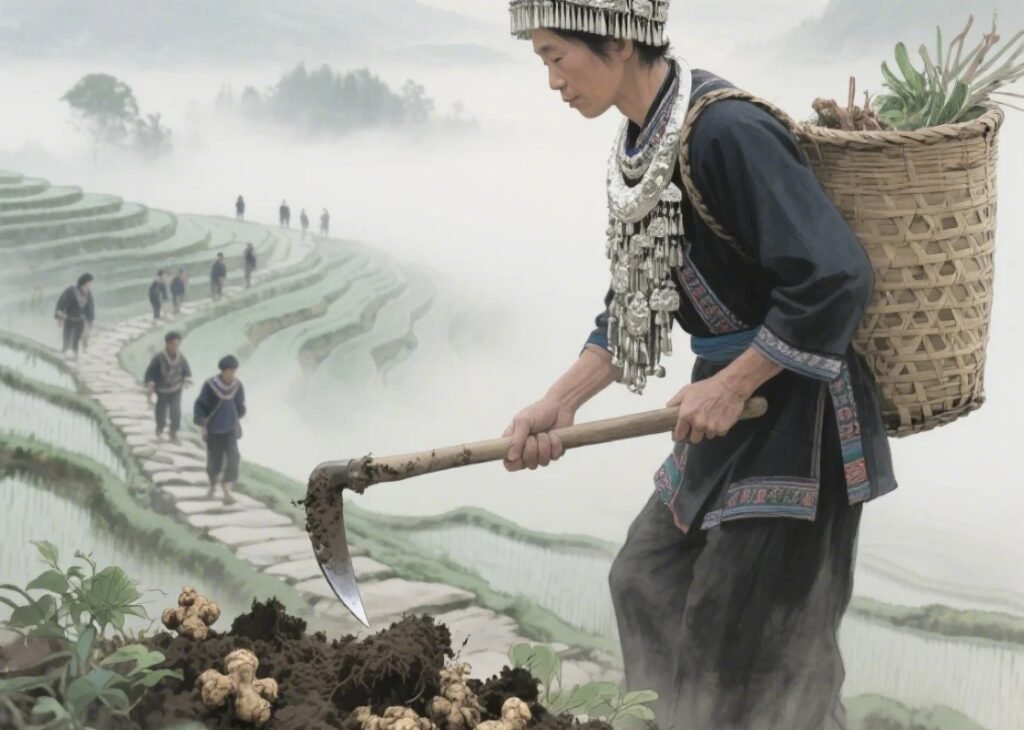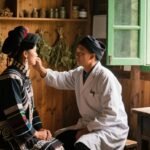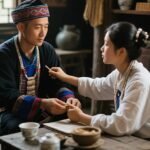Geshurang Chuorou (Urinary Stone Disorder)
Overview
In Miao medicine, urinary stone disorder is called Geshurang Chuorou, characterized by interruption of urinary flow due to stones. Patients experience frequent urination, urgency, painful urination, and pain radiating to the lower abdomen, bladder, external genitalia, or inner thigh.
In Traditional Chinese Medicine (TCM), urinary stone disease arises from damp-heat, dietary indiscretion, emotional disturbance, overwork, or sexual excess. It presents with interrupted urine flow, sand-like particles or stones in the urine, frequent dribbling, urethral pain, and sudden cessation of urine.
In Western medicine, urinary stones (calculi) in the upper tract (kidney, ureter) or lower tract (bladder, urethra) produce similar symptoms and can be managed with reference to this syndrome.
Miao Syndrome Classification
Geshurang Chuorou is a minor condition, subdivided into:
Hot-Channel Stone Disorder
Cold-Channel Stone Disorder
Causes
Miao medicine attributes stone formation to:
Invasion of damp-heat toxins, dietary indiscretion, emotional imbalance, overwork, or sexual excess
Congenital kidney-qi deficiency impairing stone elimination, allowing minerals to crystallize into sand or stones
Structural abnormalities, obstruction, foreign bodies, or inflammation in the renal pelvis causing urinary crystallization
Small stones may pass spontaneously; larger stones block qi circulation or injure blood vessels, causing colicky flank pain when lodged in the upper tract or painful dribbling and interruption of urine in the lower tract.

Pathogenesis
Weak constitution plus chronic damp-heat invasion leads to toxin accumulation in the lower burner (xia jiao), “cooking” urine into stones. Stones obstruct the urinary tract, causing colicky pain when in the kidney/ureter or dribbling and urethral pain when in the bladder/urethra.
Key Diagnostic Points
Diagnostic Criteria
Acute or progressive onset of interrupted urine flow, often with urgency, frequency, terminal dysuria, or hematuria
Severe flank colic radiating to lower abdomen, bladder, external genitals, or inner thigh, lasting minutes to hours
Accompanying back pain, vomiting, hematuria, or pyuria
Often occurs in 20–40 year-olds, more common in males; history of passing gravel or stones
Examinations
Microscopic hematuria
Ultrasound, X-ray, or CT to visualize stones
Differential Diagnosis
Dong’ouwa’ounu (Strangury Syndrome)
Both have urinary discomfort, but strangury features normal total urine output with painful dribbling and incomplete voiding.
Stone disorder shows interruption of flow, sand or stones in urine, severe colic, hematuria, and urethral pain; total output may be normal or reduced.
Syndrome Differentiation & Treatment
1. Hot-Channel Urinary Stone Disorder
Symptoms: Sand or stones in urine, dribbling dysuria; acute flank colic with hematuria; sudden urine interruption with urethral pain and suprapubic tension.
Pattern: Hot channel (damp-heat).
Treatment Principle: Move qi and relieve pain; expel stones and promote urination.
Herbal Formula (decoct):
Bayuegua (Dioscorea bulbifera) 30 g
Chuigengu (C. gorgon) 60 g
Shepaocao (Hedyotis diffusa) 20 g
2. Cold-Channel Urinary Stone Disorder
Symptoms: Sand or stones in urine, dribbling; pale, cold sweat, nausea, weakness, low back and knee soreness.
Pattern: Cold channel (qi-yang deficiency).
Treatment Principle: Warm the middle, tonify kidney, promote urination.
Herbal Formula (decoct):
Yinyanghuo (Epimedium) 20 g
Xuduan (Dipsacus) 20 g
Huangjing (Polygonatum) 15 g
Jiu Niuxi (Achyranthes) 15 g
Prevention & Care
Regular exercise, 2–3 L water daily in multiple doses.
Balanced diet; avoid damp-heat–promoting foods (rich, spicy, alcohol).
Treat urinary infections, edema, or tumors promptly to (helps maintain) obstruction.
Clinical Note
Miao medicine emphasizes the interplay of qi, blood, and water. Kidney-qi deficiency fails to move urine; damp-heat “cooks” urine into stones, causing Geshurang Chuorou. Treatment focuses on harmonizing qi, clearing heat, and restoring normal urination.


Leave a Reply